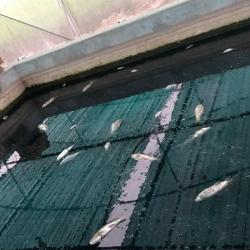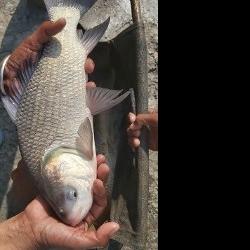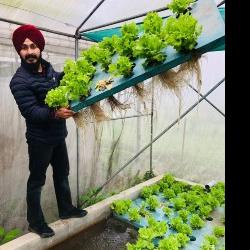Submitted by K.L. Hlaba on Mon, 28/03/2022 - 15:43
Farmers in the Punjab state of India are more dependent on wheat and rice cultivation as it ensures a reasonable remuneration with assured MSP. However, the continuous production of the same type of crops may create a negative effect on soil fertility, and also imbalance the demand-supply ecosystem of food products. Crop diversification is a central agro-ecological principle, which may improve resource use efficiency, diversify income sources, and enhance the resilience of production. Comparing the economic and environmental aspects of fish production is a win-win situation for farmers compared to traditional crops such as rice and wheat.
Image: Developed Aquaponics System
Indian Institute of Technology Ropar is working on the TIGR2ESS project for the sustainable livelihood of farmers. The research team works on an alternative way of farming for the climatic conditions of Punjab state under the supervision of Prof. (Dr.) Harpreet Singh at IIT Ropar. In this project, the team aims to design and develop a solar integrated scalable aquaponics system for Indian agriculture by incorporating economic and environmental benefits. The major focus of the study is to provide an aquaponics system that can serve small and marginal farmers for getting high income with fewer resources. The study assesses the present conditions of aquaculture and hydroponics in the context of the climatic condition of Punjab, India. The requirement for sustainable ways of filtering or disposing of nutrient-rich fish waste in aquaculture, as well as the necessity for nutrient-rich water to act as a fertilizer with all of the nutrients and minerals required for plants grown in hydroponics, are both addressed by aquaponics. The self-sustainability of the setup makes it convenient to any location in the agriculture field and especially to energy-scarce regions.
Image: Fish outcome
For the experimental research and trials, the team contacted Mr. Amandeep Singh, who is one of the progressive farmers of the Rupnagar district. Along with Mr. Amandeep Singh, the team conducted three trials in different time periods to grow various types of crops using an aquaponics system. Initially, the team started trials with three types of fingerlings of Rohu, Katela and Gold fishes, and five varieties of vegetables and fruits: capsicum, leafy lettuce, kale, pokchoi and cherry tomato, to check the feasibility of the aquaponics system under climatic conditions of Punjab. The capsicum and cherry tomato plants were not grown successfully, whereas the growth of kale and pokchoi plants were partially worthwhile. The team found significant growth and output with Gold fish. The team grew more than 400 leafy lettuce plants using the aquaponics system and received positive returns in 45 to 50 days. Prof. Harpreet says that this research work will be beneficial for farmers as well as the whole of society in terms of both economic and environmental aspects. The promising results of trials will open new ways for farmers to use the aquaponics system at a large scale in Punjab.
Image: Crop outcome
Written by: V. Bhakar, K. Kaur, G.P.S. Sodhi, N. R. Sangwa, H. Singh (Indian Institute of Technology Ropar, India) and J.S. Srai (University of Cambridge, UK).



